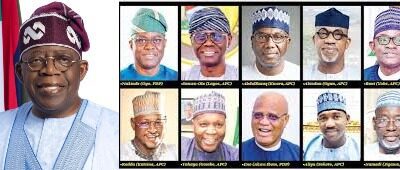Political Issues
Urging Mr. President To Rise Above Nepotism And Cronyism -By Isaac Asabor
To my view, these patronage appointments that were made in manners that are reminiscent of bazaars, or that can best be described as appointment galore will not in any way add value to the betterment of the economy as in all cases, merits were glaring jettisoned even as the ministers were screened live on Television.

As a Nigerian that has already formed a worldview about Nigerian politics during the regimes of late General Muritala Muhammed, then General Olusegun Obasanjo, late Alhaji Shehu Shagari, then Major General Muhammadu Buhari, General Ibrahim Babangida among other presidents such as late Chief Ernest Shonekan, Late General Sani Abacha and General Abdusalam Abubakar, and most recently, President Muhammadu Buhari as a democratic president, there is no denying the fact that I should be able to know when to express the view that primordial sentiments have characterized a government, or is shaping an evolving or a nascent government such as been witnessed in the ongoing administration under the leadership of President Bola Ahmed Tinubu. To say that what Nigerians have been witnessing in terms of appointments since May 29 when the government kick started is a “Paddy-Paddy government, is to say the least.
At this juncture, it expedient to say that for anyone who is truly averse to favoritism, cronyism and Paddy-Paddy government that this is the time to cover his or her face from a big shame. It is a period of crystal clear disappointment and embarrassment, not to talk of untold grief and unrelenting biliousness. This period is really inducing vomiting as the landscape of governance across all tiers of government stinks!
For the sake of clarity, it is germane to opine that favoritism, which is the broadest of these related terms, is self-explanatory as it is favoring a person not because he or she is doing the best job but rather because of some extraneous feature-membership in a favored group, personal likes and dislikes, among other sentimental qualification, so to say. In fact, favoritism can be demonstrated in hiring, giving out freebies, or awarding contracts. A related primordial sentiment is patronage, which is giving political appointments to those who may have helped elect the person who has the power of appointment.
Without any scintilla of exaggeration, favoritism has always been a source of complaint in government service from one political dispensation to another.
Thus, cronyism being part of it, is a more specific form of favoritism, referring to partiality towards friends and associates. As the old saying goes, “It is not what you know but who you know,” or, as a friend puts it “It’s not what you don’t know; it’s who is in the same political party with you or who is your church member or at worse who is your drinking partner at the beer parlour” Cronyism occurs within a network of “Paddy-Paddy” group who confer favors on one another.
Nepotism, which is a narrower form of favoritism comes from the Italian word for nephew, it covers favoritism to members of the family. Both nepotism and cronyism are often at work when political parties recruit candidates for public office.
At this juncture it is expedient to ask if favouritism or cronyism is ethical. Without scratching one’s head or racking one’s brain over the foregoing question, none of them is ethical. The reason cannot be farfetched as Aristotle has posited that one of the most basic themes in ethics is fairness as he postulated that “Equals should be treated equally and unequals unequally. Thus, “Favoritism, Cronyism, and Nepotism are all interferences to fairness because they give undue advantage to someone who does not necessarily merit certain privilege,
At this juncture, it is expedient to ask, “Why would a president who promised to serve a nation and revive its economy gets himself stuck in the blitz of nepotism? The reason for asking the foregoing question in this context cannot be farfetched as Nepotism is detrimental to good governance. Like its cousins: tribalism, favouritism, cronyism, it creates a breeding ground for corruption. In turn, corruption manifests itself in public administrations through different forms, such as abuse of power bribery, embezzlement, influence peddling, and nepotism.
Nepotism undermines the principles of the legitimacy of the government and public representation, and causes serious economic damage to society through inefficient use of the material and financial resources of the state. It damages civil society by encouraging mistrust in public authorities thereby entrenching chronic suspicion.
Nepotism causes the misappropriation of public resources, and reduces the efficiency of the public sector, causing a threat to public trust. It weakens the foundations of state security and defense, and reduces the resilience of society to modern threats.
Not only that, it widens the inequality gap and exacerbates poverty as well as contributes to the increase of crime rate.
Nepotism creates inconsistency in the application of standards, policies, rules, and evaluation processes such as performance appraisal, and this generally negates appropriate checks and balances related to workplace practices.
In politics, it impacts the employees’ productivity, job satisfaction, morale, motivation and harmony. Nepotism erodes organizational activities and processes such as goal setting, leadership, and building of team spirit. Little wonder nothing seems to be working across most Ministries, Departments and Agencies (MDAs) in Nigeria since political leaders dominate the political landscape in 1999 when the country transited from “Militocracy” to democratic system of government.
In fact, every word that ends in the suffix –ism, and which is invariably an element of primordial sentiment affects organizational commitment, loyalty and trust, and the performance of the public service.
Organizations can suffer legal ramification as a result of some cases of nepotism. Nepotism violates the standards of professional ethics in institutions, increasing psychological tension and mistrust in management and causing conflict situations within the organization. At this juncture, there is no denying the fact that nepotism is slowing the down the development of Nigeria as a country at the moment.
Given the foregoing, it is therefore expedient to urge President Bola Ahmed Tinubu to rise above every form of nepotism as it will not help his nascent administration. In fact, one of my former employers whom I worked with as a Personal Assistant before becoming a Journalist once told me, while sorting heaps CVs submitted in response to a vacancy advertisement that was published in a national newspaper, that it is always good to hire a candidate who can easily be booted out or reprimanded when found wanting than to hire a candidate that cannot be fired because of the closeness or familiarity as either family members, kinsmen or friends would come begging, and once their interventions are not heeded to, they can resort to campaign of calumny by branding the employer as being wicked. Another demerit of hiring a too familiar candidate is that he will always tell his principal or boss what he wants to hear rather than telling him the truth concerning his or her performance.
Now, among all the Assistants, Personal staff and Ministers who recently got appointed at the behest of Mr. President, who among them can be relieve of his or her position in due course without the being seen as ungrateful, and equally seen to have upset the apple cart? None of them because virtually all of them have “Sense of entitlement” as they would always have stories to tell about how they helped the president to win their political wards or constituencies.
To my view, these patronage appointments that were made in manners that are reminiscent of bazaars, or that can best be described as appointment galore will not in any way add value to the betterment of the economy as in all cases, merits were glaring jettisoned even as the ministers were screened live on Television. To this end, it is expedient to in this context urge the President to rise above primordial sentiment while making further appointments or while reviewing the respective performance of those already appointed in due course as his administration progresses by each passing day.



















